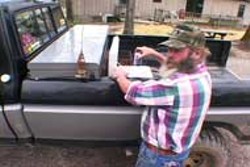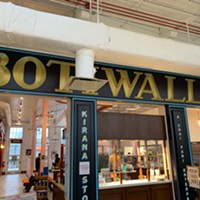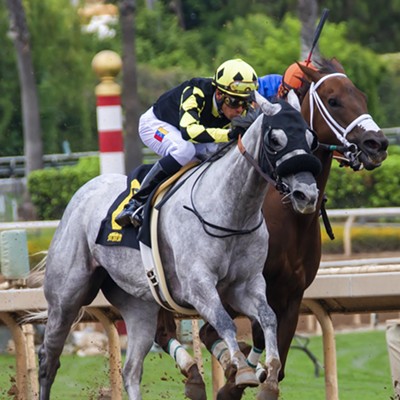"We knew we needed a subject — about the South, if not North Carolina," Bostic said in a recent telephone interview. "We wanted to get close to some good characters — something serious, but not too serious."
Why not barbecue? Both Bostic and McKenna, who grew up near Winston-Salem, are native Tar Heels. Together they produced, directed and photographed this documentary, which was first screened last September.
Barbecue unites Carolinians. Historically, it has always been the food of the masses and the food used for fundraisers, social events and family gatherings. As Ed Mitchell, owner of Mitchell Barbecue, states in the film, "It's the only thing I know of that actually can cross social, economic lines, racial lines. It doesn't make a difference... If you say, 'Let's barbecue,' we got a party."
The six primary characters who populate this film range from the rustic Blue Ox to Wilbur King, owner of a successful family-run BBQ restaurant in Kinston. King cooks 10,000 pounds of barbecue each week and also ships it across the US. (During the filming of the documentary, King's son and business partner died and King subsequently sold the business.)
In contrast to the impeccably clean kitchen at King's Barbecue, where the "pit master" of the gas grills wears long rubber gloves and spotless clothing, is Henry Smith, an 80-year-old African-American man who has been cooking barbecue the way his father taught him. We see Smith shoot a hog in its pen, slit its throat, skin it, eviscerate the hanging meat, and finally plop the carcass on a hickory fire, add coals, and taste the meat as it cooks.
Other characters are downright scary, but as Bostic said in the interview, barbecue is what gives them common ground. Blue Ox, a.k.a. Wilson Knott, is an independent caterer, a man known among his "parts" for making the best barbecue around. However, his appearance and demeanor seem better suited to the freedom lovers/anarchists of Montana than the outskirts of the ever encroaching suburbs of Raleigh and the Research Triangle. Knott's home is decorated with the trophies of a hunter, including a pathetic, blankly staring head of an albino fawn. "Thought he was a dog," Knott reveals.
The primary focus of the commentary is Paul Long's story. Long once fixed barbecue for Luciano Pavarotti. During the film, Long decides to go full-time into the world of barbecue catering by giving it a shot during one ill-fated weekend.
For those uninitiated in the finer points of North Carolina 'cue, Barbecue Is a Noun may not serve the viewer well. Bostic noted that when people in New York viewed the documentary, they came away with the knowledge that barbecue takes time and dedication. But one might also come away thinking there's a need for dentists, English teachers and personal trainers in the Carolinas.
Unfortunately, the filmmakers did not include any female pit masters — "Couldn't find any" — or any restaurants in Charlotte. When asked why the Carter family of the Old Hickory House, with their hickory fire restaurant, was not included in the section about cooking with real wood, Bostic said he was unaware of that restaurant. Bostic said that while he lived in Charlotte, his dad always took the family to Lexington Barbecue, and that's what he was familiar with. (Wayne Monks, owner of Lexington, is part of the documentary.)
Much of the barbecue in the film is Eastern style: whole pig with a vinegar-based sauce. There are a few salted Lexington-styled shoulders and a mustard-slathered South Carolina pork as well. The filmmakers include SC BBQ entrepreneur Maurice Bessinger, who suggests that through barbecue "the South will rise again".
When the narrative turns to the cooking source, wood burning (hickory) versus gas, the interviews get heated. Wilbur King noted that his dad changed from hickory fire pits to gas burning ovens in the 1950s. He said that with wood, "You could count on burning the pit down twice a year." After the conversion, his father still built a fire in the afternoon so that his customers would see and smell the smoke. But no one noticed a difference in the taste. Others scoffed at the idea that hickory wood didn't matter. Intertwined in these personal narratives are interviews with Carolinian barbecue experts — and then, curiously, New York restaurateur Danny Meyers. Huh?
Bostic and McKenna are not the first filmmakers to tackle barbecue, but they are perhaps the first to personalize it. Although the pacing seemed choppy, memorable elements were featured throughout. As someone notes, "Barbecue is a dead hog that's real warm." And the footage with Smith and Knotts standing in front of a wood burning pit, turning a split hog, seems destined for the Smithsonian, where future generations will comment, "Back then, in the rural parts of North Carolina, barbecue was done like this." Can't get no realer than that.
The documentary Barbecue Is a Noun will be screened at 3pm on Sunday, May 22, at The Light Factory. Director Hawes Bostic will be in attendance. Tickets are $10 for Light Factory and Levine Museum of the New South members, and $15 for nonmembers. Admission includes a sampling of barbecue at a reception following the screening. Call 704-333-1887 for tickets.
Eaters' Digest According to a press release, the "two fastest growing sports in America" will meet on May 28 at 3pm, when the Armour Vienna Sausage-Eating World Championship is held at NASCAR's Lowe's Motor Speedway in Charlotte. First prize is $8,500. On hand will be the top ranked eater in America, 105 lb. Sonya Thomas of Alexandria, VA. Thomas holds numerous world records including 36 dozen Louisiana oysters in 10 minutes, 11 pounds of cheesecake in nine minutes, and 48 chicken tacos in 11. Others interested in competing can register at www.ifoce.com or call 212-627-5766.
Have a restaurant tip, compliment, complaint? Do you know of a restaurant that has opened, closed, or should be reviewed? Does your restaurant or shop have news, menu changes, new additions to staff or building, upcoming cuisine or wine events? Note: We need events at least 12 days in advance. Fax information to Eaters' Digest: 704-944-3605, or leave voice mail: 704-522-8334, ext. 136. To contact Tricia via e-mail: tricia.childress@creativeloafing.com.
Speaking of Cuisine_feature.html
-
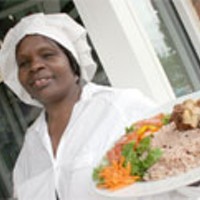
Island Beat
Jul 13, 2005 -
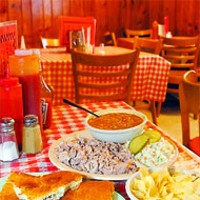
As If On Cue...
Jul 6, 2005 -

Charlotte's Brontë
Jun 15, 2005 - More »
Latest in Food & Drink Features
More by Tricia Childress
-
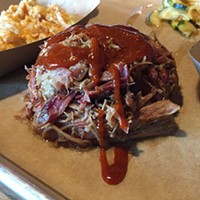
Seoul Food Meat Co's got soul
May 4, 2016 -

Aix en Provence flourishes in Myers Park
Apr 6, 2016 -

Pho and beyond at Saigon Bay Vietnamese Cuisine
Mar 2, 2016 - More »
Calendar
-

Charlotte Wine & Food Week’s Annual Sake Dinner at Mizu @ Mizu
-

Hands On Cocktail Class Featuring Gin at DTR Southpark @ DTR SouthPark
-

Angeline’s Featuring Sciandri Family Vineyards @ Angeline's
-

Aria Tuscan Grill Featuring Allegrini - Charlotte Wine + Food Week @ Aria Tuscan Grill
-

Charlotte Wine + Food Week Presented by Truist @ Charlotte, NC
-
Recipe: Ice Cream Sundae Cupcakes 6
These Ice Cream Sundae Cupcakes are filled with chocolate ganache and topped with vanilla buttercream.
-
Back of the Box: No Boil Classic Lasagne 5
Not having to boil the noodles rocks!
-
Authentic & Delicious Indian Restaurant Botiwalla NOW OPEN in Optimist Hall! 2

